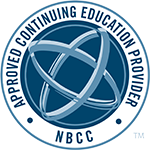Recorded Webinar
Instructor: Shannon L. Sennott, LICSW, CST
CEs/Contact Hours: 1.5
Level: Intermediate
Target Audience: Social workers and other social service providers.
Course Delivery Method and Format: Recorded webinar, self study. All courses are hosted on SmithOnline. Login information will be emailed immediately after registration to the email address entered during registration.
System Requirements: Attendees will need access to a computer with internet and the capability to play recorded videos.
Date of original webinar: May 20, 2020, noon - 1:30 p.m. ET
This course provides an affirmative framework for working clinically with erotically marginalized clients in a psychotherapy or sex therapy setting. The term erotically marginalized describes people who are at risk of being pathologized and oppressed both outside and inside the clinical setting due to their sexual identities, orientations and practices. This can include those who identify as lesbian, gay, bisexual, pansexual, asexual, demisexual, queer, trans and gender nonconforming, nonbinary, intersex, polyamorous, consensually non-monogamous, kinky, BDSM practitioners or who have alternative relationship and sexual structures in general. This course will explore the questions: How do power and privilege play out inside and outside the therapeutic space? In what ways is the work influenced by the clinician’s own identities and/or experiences? How do we address these items to provide affirmative sex therapy with erotically marginalized clients?
Registration Fee and Deadline:
$35 (one time registration fee of $5) | Ongoing
Learning Objectives:
- Name nine principles for providing affirmative sex therapy to erotically marginalized clients.
- Describe how a clinician’s own identity impacts their clinical work with erotically marginalized clients.
- List three tools clinicians can apply to their respective practices with erotically marginalized clients.
Instructor Biography:
Shannon L. Sennott, LICSW, CST, is the co-founder of Translate Gender, Inc. and the Center for Psychotherapy and Social Justice, she was clinically trained at the Smith College School for Social Work and the Eastern Group Psychotherapy Society in New York City, and is an AASECT certified sex therapist. Shannon is an adjunct faculty member at the Smith College School for Social Work, teaching family theory and sex theory, as well as, maintains a full time private practice at the Center for Psychotherapy and Social Justice in Northampton, Massachusetts. Shannon utilizes a transfeminist therapeutic approach in her work with individuals, adolescents, and families, her interests extend to working with couples, consensually non-monogamous and polyamorous relationships, and groups, and she especially enjoys working with those in alternative family structures. Her clinical orientation is influenced by both narrative therapy and dialogic practice traditions. Shannon's published paper in Women and Therapy Journal, introduces her transfeminist therapeutic approach, Gender Disorder as Gender Oppression: A Transfeminist Approach to Rethinking the Pathologization of Gender Non-Conformity. More recently, Shannon delivered the keynote for the Ackerman Institute for the Family annual conference in 2018 and she is enjoying clinically supervising and training other clinicians, institutions, and organizations in their work with erotically marginalized people. Her recent publication with Routledge Books is titled, Sex Therapy with Erotically Marginalized Clients: Nine Principles of Clinical Support.
To receive a CE certificate, you must complete the entirety of the recorded webinar or recorded video presentation. Partial credit will not be awarded to those who attend only a portion of the class. For recorded webinars and online courses, participants must complete an evaluation and a post test, noting the length of time to complete the course. Participants must earn a minimum score of 80 percent on the post test in order to earn CEs. Retesting is allowed up to five (5) times. If a passing score is not achieved, CEs will not be awarded. Links to the evaluation and post test are available in SmithOnline. Participants must also complete an attestation of completion for each fully completed course. A copy of the attestation is available in SmithOnline. It is attendee’s responsibility to contact their state licensing board/certification boards to determine eligibility to meet continuing education requirements.
Upon completing the course evaluation, successfully passing the post test and submitting the attestation, participants will be emailed their online certificate within 30 days of course completion. Participants should save and/or print the certificate upon receipt for their records. Receiving the CE certificate is contingent on submitting attestion, completion of the evaluation and passing the post test.
Continuing Education Credits and Approvals for This Course
Continuing Education (CE) credits offered vary by course. This course only offers the CE credits listed below. It is the attendees' responsibility to contact their licensing board to determine eligibility to meet continuing education requirements.
ACE
Smith College School for Social Work, #1755, is approved as an ACE provider to offer social work continuing education by the Association of Social Work Boards (ASWB) Approved Continuing Education (ACE) program. Regulatory boards are the final authority on courses accepted for continuing education credit. ACE provider approval period:11/19/2024-11/19/2027. Social workers completing this course receive 1.5 clinical continuing education credits.
CSWE
Smith College School for Social Work is accredited by the Council on Social Work Education and is therefore authorized to provide CEs as a postsecondary institution accredited by CSWE in many states. Courses offered through the School’s Program of Professional Education are awarded continuing education credits in accordance with Continuing Education Regulation 258, CMR, 31.00 in the Commonwealth of Massachusetts.
NY State
Smith College School for Social Work is recognized by the New York State Education Department's State Board for Social Work as an approved provider of continuing education for licensed social workers #SW-0169.
Approved for Counselors (LMHC/LPC)

Smith College School for Social Work has been approved by NBCC as an Approved Continuing Education Provider, ACEP No. 7110. Programs that do not qualify for NBCC credit are clearly identified. Smith College School for Social Work is solely responsible for all aspects of the programs. This program offers 1.5 contact hours.
